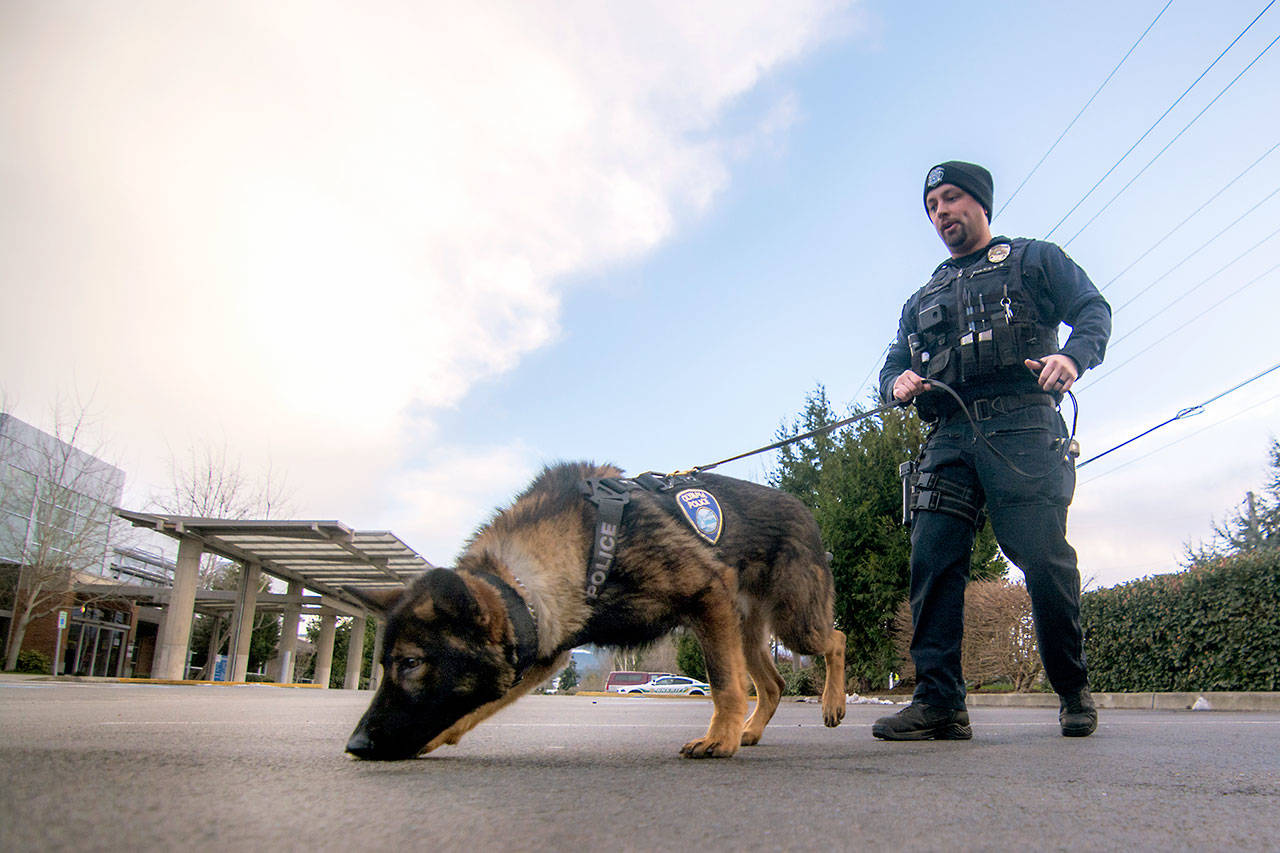SEQUIM — Training to become a police service dog is no easy task, but Port Angeles Police Department Sgt. Kevin Miller tries to make it as fun for the dogs as possible.
Miller, a master trainer with the Washington State Police Canine Association, is leading a canine academy for soon-to-be police service dogs and their handlers who will serve police departments across the Olympic Peninsula.
“We run it pretty much like high school,” he said.
“There’s different classes and disciplines.”
Handlers and their canines work on tracking, finding evidence, apprehending suspects, obedience and running obstacles.
After 12 weeks of training, which started in January, the handlers and dogs from across the Olympic Peninsula each spent 480 hours training together.
Assistant trainers include Kitsap County Sheriff’s Deputy Aaron Baker and Grays Harbor Sheriff’s Deputy Tracy Gay.
They are each training Port Angeles Police Officer Whitney Fairbanks and her partner Bogey; Sequim Police Officer Paul Dailidenas and his partner Mamba, Grays Harbor Sheriff’s Deputy Justin Rivas and his partner Tango; and Olympia Police Office Levi Locken and his partner Cooper.
Much of their time training is spent in the Sequim area — using several venues — although they have been training all over the Olympic Peninsula, Miller said.
Miller’s goal is for the training to be as fun as possible for the dogs. When practicing tacking, handlers use cut-up bits of hot dog to encourage the canines to keep their noses on the scent. It’s all positive reinforcement and at the end of the track, handlers praise their dogs.
“All we’re doing is we’re convincing the dog that this is fun and it’s bonding time between the handler and the dog,” Miller said.
“It’s really a team. You can’t just be the handler behind the dog because you’re having to make decisions on the track as well.”
To train the dogs to track, handlers spray their scent — using water in which they had soaked a T-shirt they had worn the day before — in serpentine lines.
As the dogs begin to learn to track, handlers place bits of hot dogs along the track only a few feet from each other.
Then, as the dogs become better at following the scent, they make the tracks longer and place fewer bits of hot dogs on the track until the dogs are tracking up to a mile.
“The hardest thing to track on is asphalt, so we do that from the beginning,” he said. “That’s all we do.”
Just like in high school, not all the dogs make it through the training and become police dogs, he said.
Cooper, a 17-month-old German Shepherd from Serbia, recently joined the Olympia Police Department after the department’s previous recruit failed the academy.
“The dog that failed out, he would track for about five feet and if a leaf blew over here, it would take him five minutes to get back on task,” Miller said. “We don’t have time for that.”
He said having the dog fail out of the academy was tough on the handler’s family, but the top priority is having a dog that can get the job done.
Cooper, who last Sunday had been in the United States for only four days, was already a “tracking machine,” and Miller was confident Cooper would catch on quickly during the five remaining weeks of the academy.
Miller has worked with dogs much of his life, starting with hunting dogs when he was 11 years old and moving on to police dogs in high school. He’s been a canine handler for the Port Angeles Police Department for 26 years, he said.
The reason he has devoted his life to working with dogs to catch criminals is the teamwork and bond he builds with his partner, he said.
“I’m not even sure how to put it into words, but I just enjoy the teamwork,” he said. “When the cops can’t find a suspect, they call us.”
Millers said there are typically two kinds of people who end up working with dogs during their law enforcement careers.
They either really like dogs, or they want to use dogs as a tool to find and apprehend criminals.
“I just really like dogs,” he said.
________
Reporter Jesse Major can be reached at 360-452-2345, ext. 56250, or at jmajor@peninsuladailynews.com.

